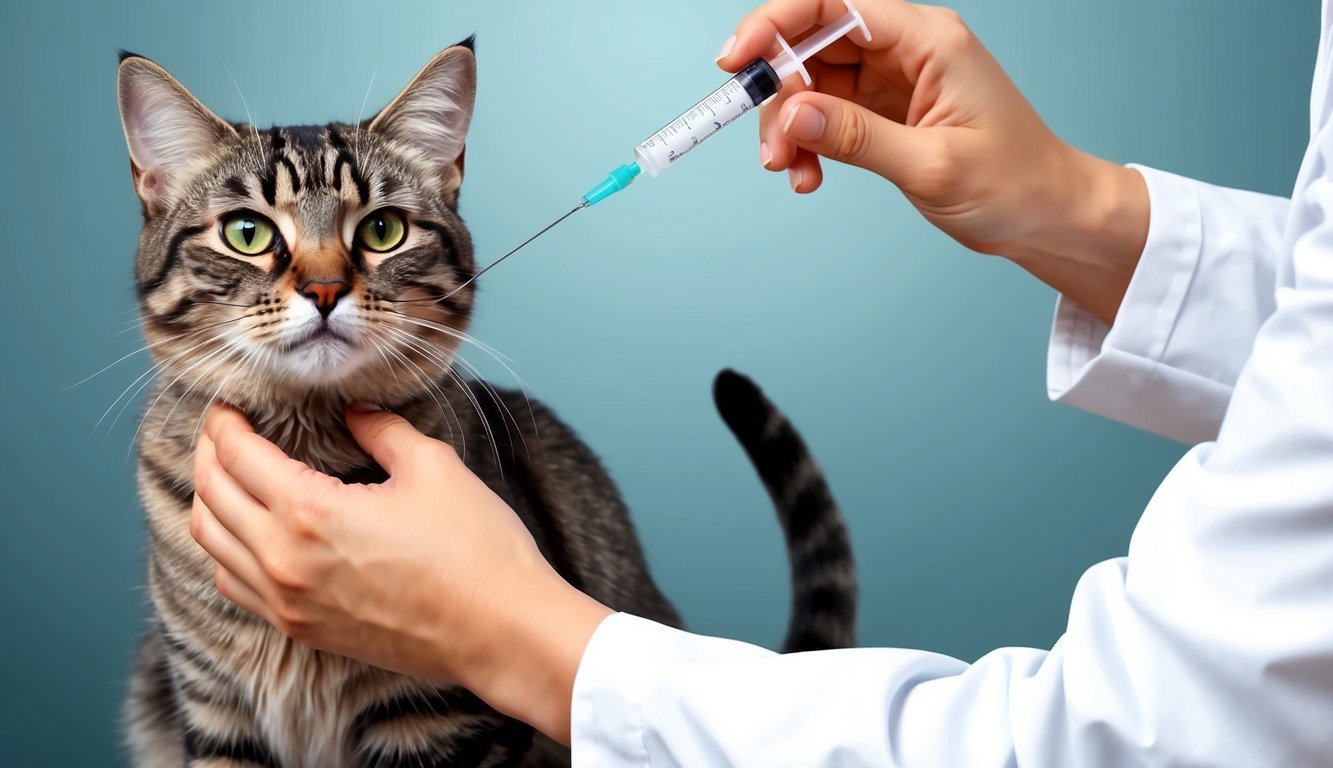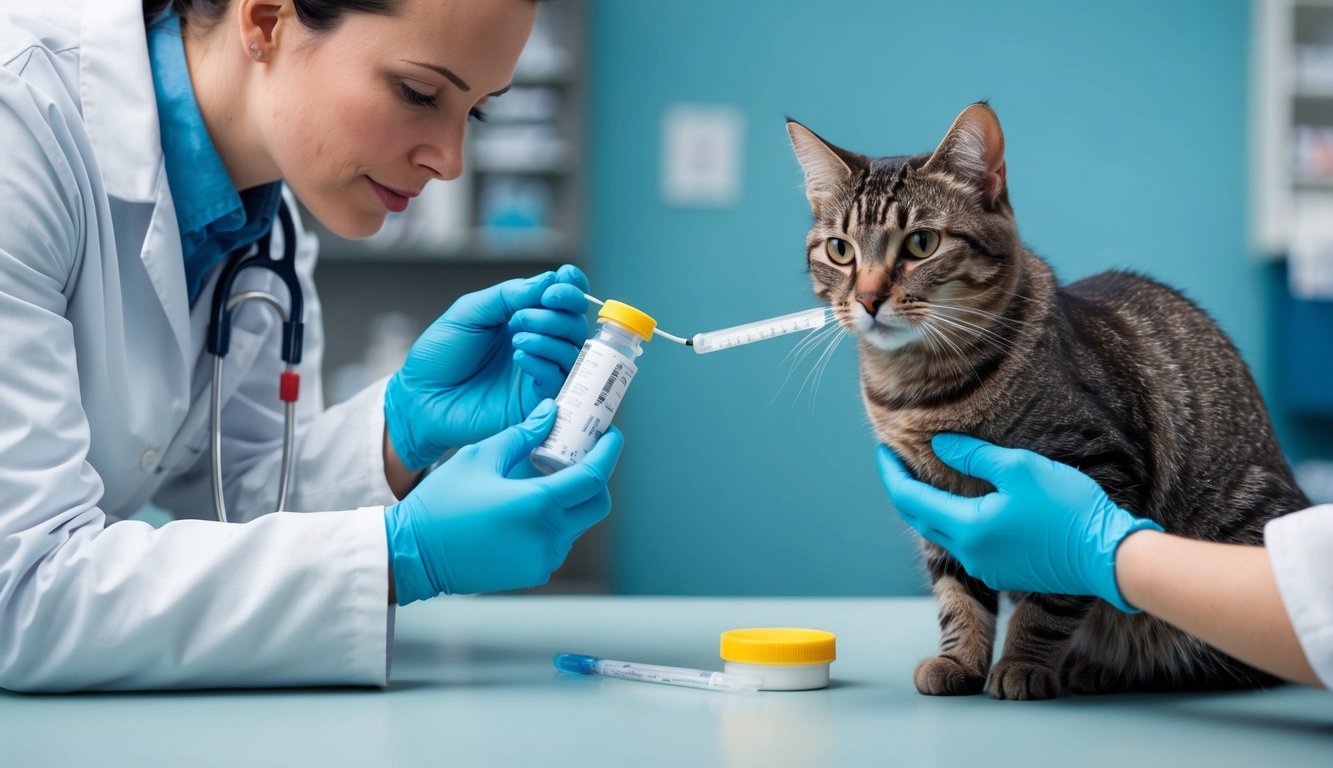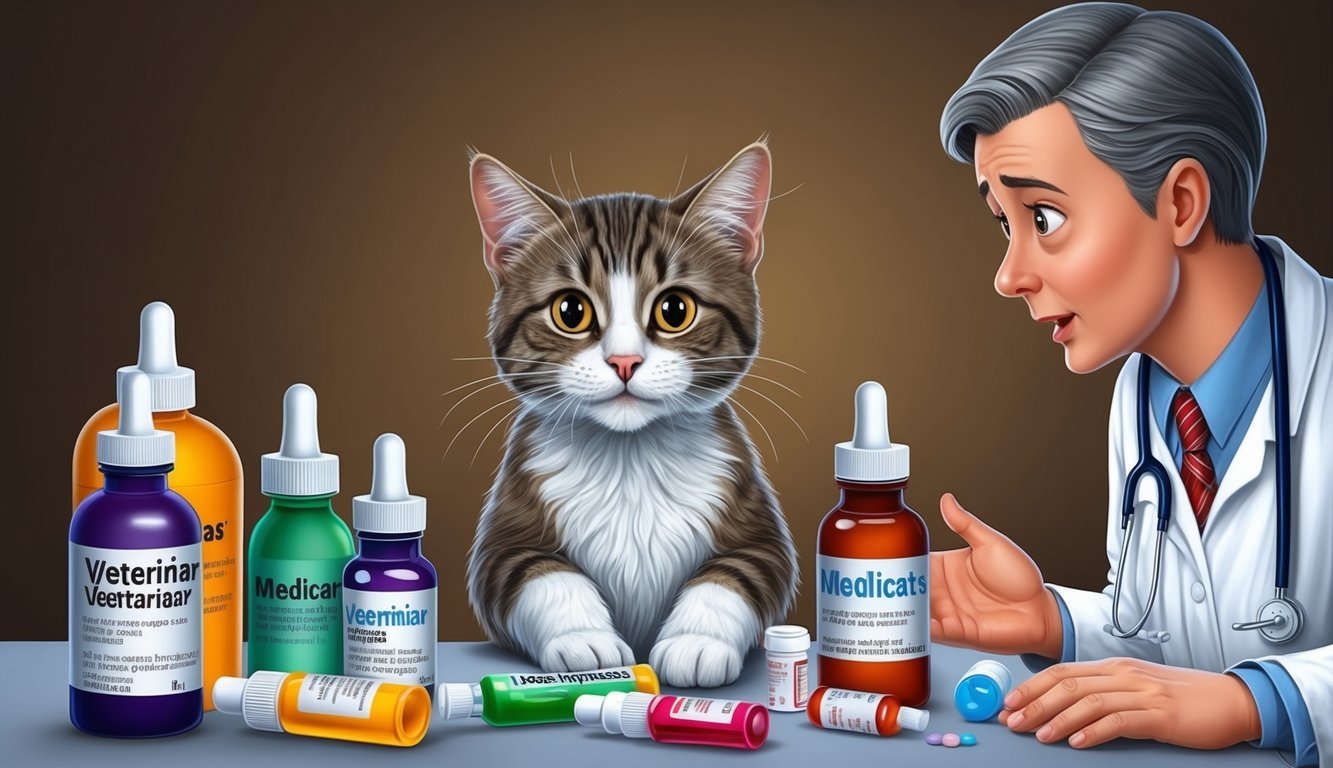Prednisolone is a vital medication often prescribed for feline patients dealing with various health issues.
This steroid, classified as a glucocorticoid, works as a powerful anti-inflammatory, making it an essential tool for treating conditions like allergies, asthma, and certain immune disorders in cats.
As a responsible pet owner, understanding the uses, dosage, and potential side effects of prednisolone can help you make informed choices about your furry friend’s health.
When considering prednisolone for your cat, it’s crucial to be aware of the specific conditions it treats and how it operates in the body.
While it can provide significant relief and improve your pet’s quality of life, there are precautions and potential interactions to keep in mind.
Consulting with your veterinarian will help ensure that this medication is a safe choice for your beloved companion.
Being proactive in your pet’s healthcare can lead to better outcomes.
Knowing when and how to use prednisolone is key, and the right dosage will make all the difference in achieving the desired effects while minimizing risks.
Key Takeaways
- Prednisolone is commonly used to treat inflammation and immune-related conditions in cats.
- Proper dosage and administration are crucial for effectiveness and safety.
- Regular veterinary consultations are essential when using corticosteroids in long-term treatment.
Understanding Prednisolone
Prednisolone is a medication that plays a crucial role in managing various health conditions in cats.
This section covers what prednisolone is, how it differs from prednisone, and its mechanism of action.
What Is Prednisolone?
Prednisolone is a synthetic glucocorticoid used to treat a variety of inflammatory and immune-related conditions in cats.
It mimics the effects of cortisol, which is a hormone produced naturally by the adrenal glands.
This medication is often prescribed for conditions such as allergies, asthma, and certain autoimmune diseases.
You may find prednisolone in different forms, including tablets, liquid, and injectable solutions.
Its flexibility in administration can be particularly helpful when treating cats, who can be fussy about taking medications.
If your cat is facing chronic inflammation or requires immune suppression, your veterinarian might suggest prednisolone as a suitable option.
Prednisolone Vs. Prednisone
While prednisolone and prednisone are often discussed together, there are key differences between the two.
Prednisone is actually a prodrug that converts to prednisolone in the liver after administration.
For most cats, veterinarians may prefer prednisolone since it does not require conversion and thus acts more quickly in the body.
Both medications belong to the corticosteroid class and share similar anti-inflammatory properties.
However, if your cat has liver issues, prednisolone is usually the safer choice, as it bypasses the liver conversion process.
Be sure to consult your vet on which medication is best suited for your cat’s specific health needs.
Mechanism of Action
Prednisolone works primarily by binding to glucocorticoid receptors in various tissues.
This interaction leads to a series of actions that help reduce inflammation and modulate immune responses.
By suppressing the immune system, prednisolone decreases inflammatory cell activity and the production of substances that contribute to swelling and pain.
This medication also impacts metabolism, affecting how the body processes glucose, proteins, and fats.
As a result, you may notice changes in your cat’s appetite and thirst levels while on prednisolone.
Regular monitoring by your veterinarian is essential to ensure your cat’s health remains stable throughout the treatment.
Medical Uses of Prednisolone in Cats
Prednisolone is frequently prescribed to address various medical conditions in cats, especially when inflammation or immune system disorders are involved.
This medication plays a crucial role in managing allergies, autoimmune diseases, and even certain types of cancer.
Here’s a closer look at its primary uses.
Treating Inflammation and Allergies
Prednisolone is a potent anti-inflammatory medication.
It helps reduce inflammation associated with conditions like feline asthma, inflammatory bowel disease, and skin allergies.
When your cat suffers from chronic conditions, you may notice symptoms like coughing, wheezing, or persistent itching.
Prednisolone can relieve these symptoms by targeting the underlying inflammation.
Dosage may range according to your cat’s needs, typically between 0.5 mg/kg to 2 mg/kg of body weight.
Always consult your veterinarian for the correct dosage and treatment plan.
Managing Autoimmune Diseases
Cats with autoimmune diseases often experience their immune system attacking healthy cells.
Prednisolone helps manage these conditions effectively.
For example, in immune-mediated hemolytic anemia, where the body destroys its red blood cells, this medication can suppress the immune response and stabilize your cat’s health.
Taking prednisolone can lead to a marked improvement in your pet’s energy levels and overall quality of life.
Monitoring by your veterinarian is essential to adjust treatment based on your cat’s response.
Cancer Therapy
When it comes to cancer, prednisolone serves multiple purposes.
It can help reduce inflammation associated with tumors, improving your cat’s comfort.
In some cases, it may be part of a broader treatment plan, including chemotherapy.
Prednisolone can also stimulate appetite, which is crucial for maintaining strength and vitality during treatment.
Your veterinarian will assess your cat’s specific type of cancer and develop a tailored approach to manage symptoms and side effects.
Supporting Other Conditions
Besides treating allergies and managing autoimmune diseases, prednisolone can also support cats dealing with various other health issues.
For example, if your cat has chronic pain from joint issues, this medication can help relieve that discomfort.
It’s also sometimes used for inflammatory conditions in organs, such as the liver or kidneys.
Veterinarians may also prescribe it when treating certain infections or during severe stress to help stabilize your pet’s condition.
Always follow your veterinarian’s guidance to ensure the best outcomes for your cat’s health.
Dosage and Administration

When it comes to administering prednisolone to your cat, determining the right dosage and understanding the forms available are crucial.
This ensures effective treatment while minimizing potential side effects.
Here’s what you need to know.
Determining the Right Dosage
The dosage of prednisolone for cats typically ranges from 0.1 mg to 3 mg per pound of body weight.
The exact dose depends on the specific condition being treated.
For example, a common dosage for inflammation is 0.5 mg/lb, while higher doses may be required for immunosuppressive therapy.
Your veterinarian is your best resource in determining the appropriate dosage.
They will check your cat’s weight, health status, and response to treatment.
Always follow your veterinarian’s advice closely.
Avoid adjusting the dosage without consultation and monitor your cat for any signs of adverse effects, especially at higher doses.
Forms of Prednisolone Available
Prednisolone comes in various forms, making it easier to administer to your cat:
- Tablets: These are the most common form and can be given directly or hidden in food.
- Liquids: Liquid formulations may be preferable for cats that have difficulty swallowing tablets.
- Injectables: For severe cases, your veterinarian may recommend injections, which can provide faster relief.
Choose the form that works best for your cat.
If your cat refuses to take tablets, the liquid form might be the better option.
Guidelines for Safe Administration
When administering prednisolone, keep the following guidelines in mind:
-
Follow the Prescription: Always adhere to the dosage prescribed by your vet. Adjustments should only be made upon their recommendation.
-
Consistency is Key: Give the medication at the same times each day to maintain stable levels in your cat’s system.
-
Monitor for Side Effects: Common side effects include increased thirst and appetite. If you notice excessive side effects or behavioral changes, contact your vet immediately.
-
Complete the Course: Unless directed otherwise, ensure you complete the entire course of medication. Stopping early can lead to a relapse.
By understanding dosage and administration, you’re taking a vital step in ensuring your cat’s health and recovery.
Potential Side Effects
When considering prednisolone for your cat, being aware of potential side effects is essential.
While many cats tolerate the medication well, some side effects can still occur, particularly with long-term use or higher doses.
Common Side Effects
Cats may experience several common side effects when taking prednisolone.
You might notice increased thirst and appetite, which often leads to increased urination as well.
Other typical effects include:
- Vomiting: Some cats may show signs of nausea or vomiting.
- Diarrhea: Changes in bowel movements can occur, so keep an eye out.
- Weight Gain: With increased appetite, unintentional weight gain can happen.
Monitoring your cat’s behavior closely after starting this medication is important to catch any adverse reactions early.
Serious Adverse Reactions
In rare cases, cats can develop serious side effects from prednisolone.
If you notice any of the following signs, contact your veterinarian immediately:
- Severe Lethargy: A sudden lack of energy can indicate a severe reaction.
- Signs of Infection: Increased susceptibility to infections may manifest as unusual coughing, sneezing, or other health changes.
- Behavioral Changes: Increased aggression or withdrawal can signal distress.
Additionally, if prednisolone is given without proper supervision, there’s a risk of Cushing’s disease, a serious hormonal disorder.
Monitoring is essential.
Long-Term Use Concerns
Long-term use of prednisolone raises specific concerns.
Prolonged therapy can lead to more significant health issues, such as:
- Weight Changes: Sustained appetite increase can result in significant weight gain.
- Diabetes Risk: Cats on long-term corticosteroids may have an increased risk of developing diabetes.
- Immune System Suppression: Extended use might weaken your cat’s immune system, making them more vulnerable to infections.
Regular veterinary check-ups are crucial for cats on long-term prednisolone therapy to manage these potential risks effectively.
Precautions and Interactions
Before administering prednisolone to your cat, it’s essential to consider potential health issues and how it interacts with other medications.
Awareness of these factors can significantly affect your cat’s treatment and well-being.
Pre-Existing Conditions to Consider
If your cat has certain pre-existing conditions, be cautious when using prednisolone.
Conditions such as diabetes can worsen, as steroids may elevate blood sugar levels.
Liver dysfunction and kidney disease may also complicate treatment, as steroid metabolism can be impaired.
High blood pressure can spike with corticosteroid use, so it’s prudent to monitor your cat if they have any history of hypertension.
Infections may become harder to manage as prednisolone suppresses the immune system.
Autoimmune diseases may require careful dosage adjustments since the medication is immunosuppressive.
Always consult your veterinarian to evaluate whether your cat is a suitable candidate for this medication.
Interaction with Other Medications
Prednisolone can interact with various other medications, making it crucial to inform your vet about any ongoing treatments.
For instance, using non-steroidal anti-inflammatory drugs (NSAIDs) alongside corticosteroids can increase the risk of gastrointestinal issues.
Cyclosporine, used for immune-related conditions, may amplify the effects of prednisolone, necessitating dosage adjustments.
Certain antibiotics can also interact, potentially altering how each drug works.
To maintain your cat’s safety, provide a thorough list of all medications and supplements your cat is taking.
Your vet can then assess potential interactions and modify the treatment plan as needed.
Monitoring Your Cat’s Health
While your cat is on prednisolone, make sure to monitor it regularly.
Signs of increased thirst and appetite are common side effects, so pay close attention.
Also, keep an eye out for unusual behavior or symptoms that may signal complications.
Blood tests may be necessary to check liver function and monitor kidney health, especially during prolonged use.
Regular vet visits ensure your cat’s response to the medication is evaluated.
Managing your cat’s health effectively while on prednisolone involves collaboration with your vet.
Together, you can adjust dosages or switch treatments based on your cat’s condition and needs.
Considerations for Long-Term Treatment

When considering long-term treatment with prednisolone for your cat, it’s crucial to think about how to adjust the treatment plan over time.
Monitoring for chronic side effects is essential, as is supporting your cat’s overall health during this period.
Each aspect plays a vital role in ensuring a comfortable and effective treatment journey.
Adjusting Treatment Over Time
As your cat remains on prednisolone, make sure to work closely with your veterinarian.
Regular check-ups can help you assess the effectiveness of the treatment and its side effects.
- Dosage Adjustments: Depending on your cat’s response, the dosage may need tweaking. Higher doses increase the risk of side effects like osteoporosis or ulcers.
- Watch for Comorbidities: If your cat has other conditions, such as diabetes or Addison’s disease, adjustments might be necessary to avoid complications.
Frequent monitoring can help prevent serious issues related to prolonged use, ensuring that your cat remains comfortable and healthy.
Recognizing Chronic Side Effects
Being aware of potential chronic side effects is vital when your cat is on long-term prednisolone.
- Common Side Effects:
- Urinary Tract Infections: Cats on steroids are more prone to infections. Watch for increased urination or signs of discomfort.
- Pancreatitis: A significant risk factor, this condition can cause lethargy and loss of appetite.
- Cataracts: Long-term use can lead to cataract formation, impacting vision.
It’s essential to monitor your cat’s behavior and health closely.
Report any concerning symptoms to your veterinarian immediately for timely intervention.
Supporting Your Cat’s Overall Health
Supporting your cat’s health while on prednisolone is equally important.
Making dietary changes and adopting preventive measures can have a significant impact.
- Nutrition: Offer a balanced diet, rich in calcium and vitamin D, to combat potential bone loss due to osteoporosis.
- Regular Exercise: Encourage gentle play to maintain physical health and reduce stress.
- Routine Vet Visits: Regular examinations will help detect any complications early, such as depression or delayed healing.
By focusing on these aspects, you can help ensure a better quality of life for your cat, even while undergoing long-term treatment.
The Role of Veterinarians
Veterinarians play a crucial role in managing your cat’s health, especially when prescribing medications like prednisolone.
They help ensure that you follow the appropriate guidelines for your cat’s treatment.
Regular consultations and check-ups will help monitor your cat’s immune response and overall health.
Consulting with Your Vet
Before starting prednisolone, make sure to consult with your veterinarian.
They will evaluate your cat’s specific condition and recommend the correct dosage.
The initial dose typically ranges from 0.1 mg to 3 mg per pound, depending on the issue being treated.
Your vet will consider factors like age, weight, and any underlying health problems when prescribing the medication.
It’s important to share any prior health issues your cat has had or other medications they are currently taking.
Communication helps your vet avoid potential drug interactions and ensure the safest treatment plan.
Ongoing Management and Check-Ups
Regular follow-up appointments are vital when your cat is on prednisolone.
These check-ups allow your veterinarian to monitor both effectiveness and side effects.
Prednisolone can lead to increased thirst and appetite, so your vet will assess whether the benefits outweigh any adverse effects.
Your veterinarian may adjust the dosage based on your cat’s response.
It’s crucial to stick to their instructions when tapering the medication, as rapid changes can lead to worsening symptoms.
During these visits, your vet will also keep an eye out for signs of complications, such as weight gain or changes in energy levels, which can affect your cat’s immune system.
Regular monitoring can prevent long-term issues and support your cat’s health throughout treatment.
Frequently Asked Questions

When considering prednisolone for your cat, you may have several questions regarding its use, potential side effects, dosing, and the conditions it treats.
Here are some common inquiries from cat owners.
What are the potential side effects of administering prednisolone to my cat?
Common side effects of prednisolone in cats include increased thirst and appetite, as well as possible digestive upset.
It’s worth noting that cats typically tolerate steroids better than dogs, with fewer adverse effects.
Keep an eye on your cat for any unusual behavior or symptoms.
How should I determine the proper dose of prednisolone for my cat?
The dosage of prednisolone can range from 0.1 mg to 3 mg per pound of body weight, depending on the specific condition being treated.
It’s often administered every 12 hours initially and then adjusted based on your veterinarian’s guidance.
Always consult your vet for the best dosing strategy tailored to your cat.
Can prednisolone usage lead to severe complications in felines?
While prednisolone is generally safe when used as directed, misuse or long-term use can lead to complications like suppression of the immune system and adrenal gland issues.
It’s crucial to monitor your cat and maintain regular veterinary check-ups to catch any potential problems early.
For what conditions is prednisolone prescribed for felines?
Prednisolone is often prescribed for conditions involving inflammation, such as allergies, certain cancers, and autoimmune diseases.
It’s particularly effective in managing chronic inflammatory issues like gingivitis or skin conditions.
Your vet will determine if it’s appropriate for your cat’s specific situation.
Is it common for prednisolone to alleviate itching in cats with allergies?
Yes, prednisolone can be effective in reducing itching associated with allergies in cats.
Its anti-inflammatory properties help manage the symptoms of allergic reactions, providing your cat with relief.
However, ensure your veterinarian confirms that it is the right treatment for your cat’s allergy.
How can prednisolone assist in improving my cat’s respiratory issues?
Prednisolone can reduce inflammation in the airways, making it easier for cats with respiratory problems to breathe.
This medication can be particularly beneficial for conditions like asthma.
Always follow your vet’s instructions when using prednisolone for respiratory concerns.


